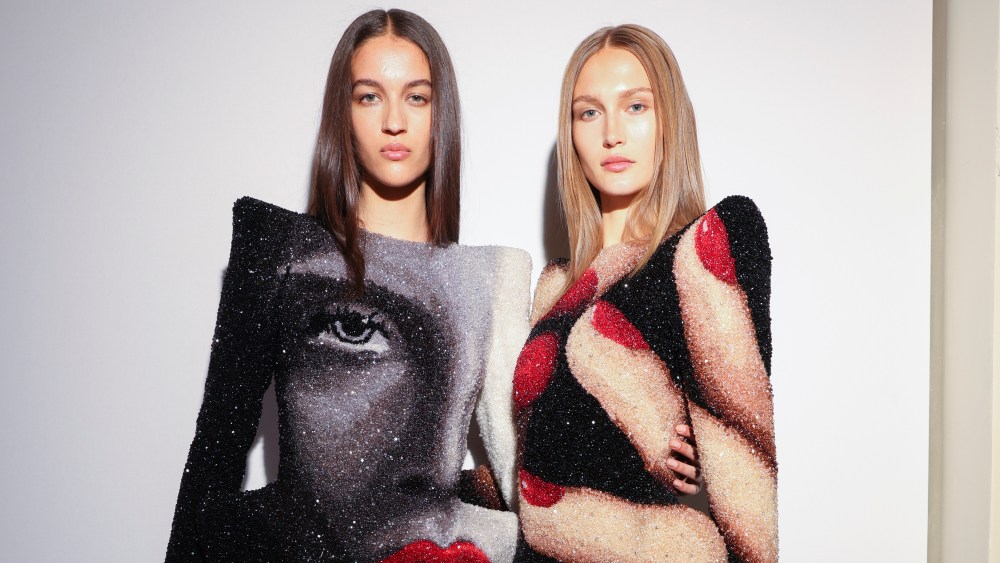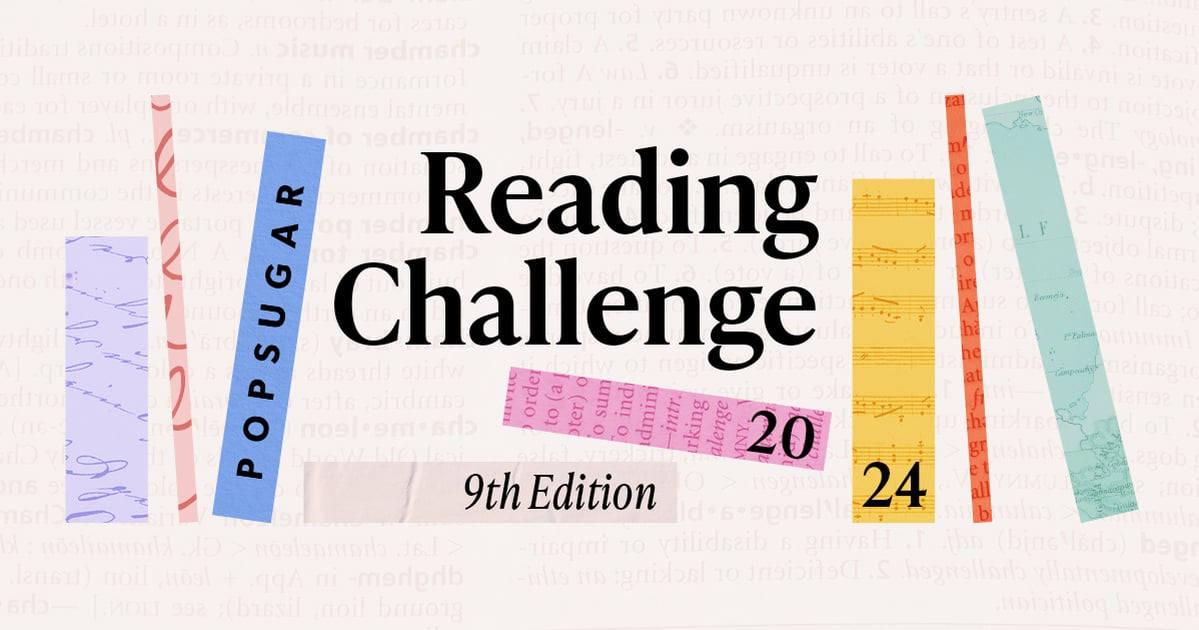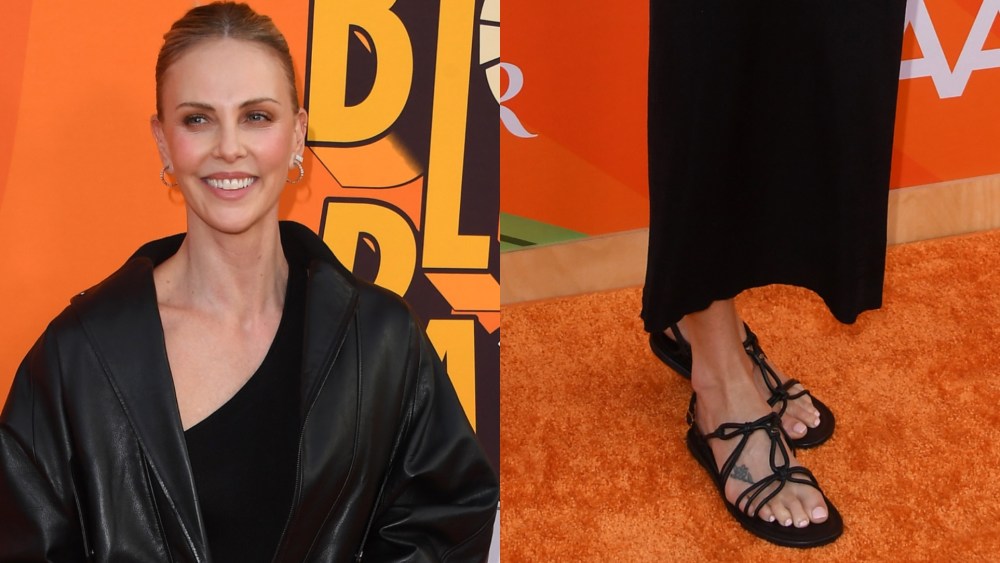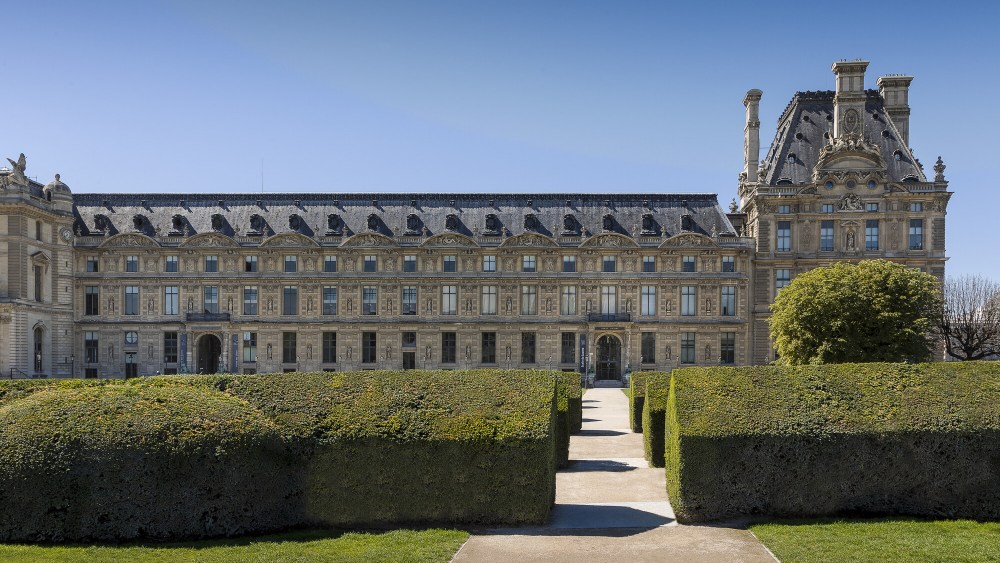PARIS – Hot lips took on a new meaning — and strategy — at the recent Balmain spring 2025 fashion catwalk display.
The show opened with a minidress spangled with images of a ruby-red mouth and fingernails. Variations on that theme dominated the runway, with dense, glittering embroideries on evening columns, sculptural cocktail dresses, jumpsuits and cropped jackets, all teasing color cosmetics, a category that the brand has yet to introduce.
Some models carried purses shaped like the eight fragrances from Les Éternels de Balmain, the line that launched in late August as the house’s reentry into the fragrance category.
Related Articles
“I wanted to include the beauty world into the fashion world, and I believe that’s going to be a really strong twist for the future,” Balmain artistic director Olivier Rousteing said backstage.

Rousteing wasn’t alone in tapping the catwalk as a way to build awareness for cosmetics. Other houses such as Nina Ricci and Victoria Beckham also used the Paris runways to help launch new fragrances.
The two-for-one approach makes sense at a time when luxury brands are tightening their belts in response to a sharp slowdown in demand. Not only does a combined fashion show and fragrance launch save on marketing expenses, but it also highlights a brand’s most accessible products.
“This is a crisis period, clearly, so the hunt for revenues is on,” said Eric Briones, luxury consultant and author of the book “Gen Z and Luxury,” published last week. “More than ever, in a context of ongoing hyper-inflation, brands are chasing affluents and Gen Z.”
In that environment, beauty is a strategic asset, and the runway a global platform.
“You have to exploit it to the hilt, and that means not just driving buzz for the sake of buzz. You have to get the most out of the eyeballs on this event,” Briones said.
The Nina Ricci show in Paris doubled as a launch party for its new fragrance Vénus, a clear example of the “one brand” strategy promoted by parent company Puig throughout its portfolio.

“The coherence of codes, visual language and idea of this Nina Ricci woman across fashion and Vénus was really key,” said Edwin Bodson, director of Nina Ricci Fashion and Beauty.
The revival of the brand under creative director Harris Reed entails both sides of its business. “Vénus is a continuation of that journey,” Bodson noted.
Reed sent out a handful of looks that directly referenced the new scent, but sidestepped a literal interpretation of the perfume’s gold-colored, shell-shaped bottle. Instead, model Colin Jones came out in a stunning black column dress, her face screened behind a panel of stiff pleated tulle.
“With Harris, we wanted to put elements in the show that teased some codes of Vénus,” said Bodson.
The fragrance references Art Deco, which was an obsession of Robert Ricci, the son of Nina Ricci. The jewelry in the show was an extension of this aesthetic, too.
After, attendees headed to the garden to sip Champagne in front of a display of perfume bottles and take in a live performance by Swedish singer Lykke Li, dressed in the final show look.

“There, you see how Harris’ vision and fashion really transposes in an event that celebrates all these codes,” said Bodson. “It makes it so strong to have that coherence.”
Houses that take a holistic approach to fashion and beauty have a clear edge, according to data research and insights firm Launchmetrics.
The Vénus launch generated a media impact value, or MIV, of $894,000, equivalent to 27 percent of the total show MIV, according to data collected between Sept. 21 and Oct. 8. It was driven mainly by guests using the hashtag #VénusDeNinaRicci — mentions of which accounted for 19 percent of total show MIV.
By comparison, Les Éternels de Balmain garnered MIV of $841,000, accounting for 5 percent of total show MIV, while Victoria Beckham’s fourth fragrance, Rêverie 21:50, generated $325,000 in MIV, or 6 percent of the show total, the Launchmetrics figures showed.
Beckham’s display at Château de Bagatelle near Paris was filled with references to her latest scent, which is rooted in a location and moment in time — in this case, a date night with husband David Beckham in a rice field in Java, Indonesia.
Katia Beauchamp, chief executive officer of Victoria Beckham Beauty, explained she and Beckham always planned to launch the fragrance at the show, but the designer gradually decided to develop the Rêverie theme across various touch points.
“She envisioned it being a moment to transport people to that dream-like state,” said Beauchamp. “We believe in this idea of fragrance being the bridge between fashion and beauty. It felt right to leverage that moment with a big audience to launch and get people to start to be curious about this chapter in her autobiography, because we think of fragrance as being led by stories and memories that are personal.”
They wanted to eschew a loud marketing moment.
“We did a bit of a takeover, where we showed the bottle larger than life, the campaign video and scented everything,” said Beauchamp. That included the Champagne cocktails and blankets in which people could wrap themselves.

The Victoria Beckham show experience has inspired other activations, including a pop-up on the New York City High Line, which in some way mimics the experience in Paris.
Using fashion shows to leverage beauty products is accelerating, but not new. Viktor & Rolf’s spring 2005 catwalk display famously seconded as a venue to launch the fragrance Flowerbomb, for instance.
Another example: As a guest couturier at Jean Paul Gaultier for fall 2022, Rousteing raised eyebrows — and nearly broke the internet — by designing a glass top that closely resembled the brand’s torso-shaped Le Male perfume bottle, and a skirt evoking its tin-can packaging.
Meanwhile, Hedi Slimane used his film for the Celine fall 2024 collection to sneak in a lipstick launch.
Fashion historian Alexandre Samson, a curator at the Palais Galliera museum in Paris, noted that fashion houses have peddled their own fragrances ever since Paul Poiret launched his own perfume in 1911, and fashion shows have historically provided a showcase for these ancillary products.
“You could see a historic precedent in the fact that couture houses organized their shows in their salons, and you had to enter through a boutique on the ground floor that sold small items, and beauty and fragrance,” he said. “It was a kind of marketing device.”
In the case of Christian Dior, his debut fragrance Miss Dior launched the same year that he founded the fashion brand in 1947. “It was part and parcel of his vision for the house,” Samson said. “He used it to scent his salons, so as soon as you walked in, you smelled Miss Dior.”
Samson was reluctant to read too much into the series of launches at Paris Fashion Week, noting that the current downturn is just the latest in a spate of financial crises since the Great Depression.
“Yes, there is a kind of opportunism, but there always has been,” he said. “It’s a strategy that’s made possible today by the fact that the beauty market has seen huge growth. These days, every influencer can develop their own beauty line, so it’s surfing on a current trend. It makes sense that fashion is playing with that.”
Delphine Vitry, cofounder and CEO of luxury consultancy MAD, said that some brands leveraging fashion runways for beauty are small and not all in prime financial shape. So teaming fashion and beauty on a catwalk gives great bang for the buck.
“The fashion show for some of these brands is the major event in terms of communication,” she said, adding that displaying fragrance or cosmetics there can help legitimize a house’s branching into the category.
For the product itself, “it’s exciting and makes great fun noise around a launch,” said Madonna Badger, a founder and chief creative officer at the new Futura Collective agency. “It brings beauty directly into the center of the stage.”
Launching fragrance or makeup at a fashion show should not be just for Instagram’s sake or for making a gratuitous sale, though. “That’s the watch-out,” Badger cautioned. “You don’t want to lose the major edge, which is a designer’s vision.”
This could happen when too much share of voice is given to a fragrance or cosmetics, thereby limiting a fashion collection’s ability to shine. “A runway above all is a very special moment when the designer’s creativity will shout and stand out,” said Vitry.
It is important, as well, to understand what comes next. “What are you going to do next year?” said Badger. “What’s going to be the right sort of move for the brand?”
Quantifying the success of two-pronged strategies is not a precise science.
“We do measure ‘smell reach,’” said Beauchamp. “Which means how many people are we getting to smell this fragrance? The show is a very concentrated place to get key people to experience it olfactively. Even though we know people will be drawn into the story, into Victoria, into the beautiful images and videos, the smell is critical.”
Then there’s the ensuing content both on a brand and others’ channels.
“We try to take up space in the conversation around the show,” said Beauchamp. That included buying more traditional media, activating the community attending the display and sampling the perfume.
“It feels like you’re getting a bit of a piece of the house of Victoria Beckham,” she said. “It feels very special and considered, and you see how it’s connected through to the whole house.”
Establishing a personal connection with a brand’s creative director is key to fueling a sense of authenticity that is important to the Gen Z customer, especially given the prevalence of beauty dupes, said Briones.
“At Balmain, the true star is Rousteing,” he said. “He carried the whole project from A to Z. It’s an anti-marketing approach to suggest that all this comes from the genius brain of a designer.”



